 |
|---|
| This article is part of a series on the politics and government of Sierra Leone |
| |
The Young People's Party is a political party in Sierra Leone [1] without parliamentary representation.
 |
|---|
| This article is part of a series on the politics and government of Sierra Leone |
| |
The Young People's Party is a political party in Sierra Leone [1] without parliamentary representation.

Sierra Leone, officially the Republic of Sierra Leone, informally Salone, is a country on the southwest coast of West Africa. It is bordered by Liberia to the southeast and Guinea to the northeast. Sierra Leone has a tropical climate with a diverse environment ranging from savanna to rainforests, a total area of 71,740 km2 (27,699 sq mi) and a population of 7,092,113 as of the 2015 census. The capital and largest city is Freetown. The country is divided into five administrative regions which are subdivided into sixteen districts. Sierra Leone is a constitutional republic with a unicameral parliament and a directly elected president. Sierra Leone is a Muslim majority country at approximately 78%, though with a politically influential Christian minority at about 21%.
Sierra Leone first became inhabited by indigenous African peoples at least 2,500 years ago.The Limba were the first tribe known to inhabit Sierra Leone. The dense tropical rainforest partially isolated the region from other West African cultures, and it became a refuge for peoples escaping violence and jihads. Sierra Leone was named by Portuguese explorer Pedro de Sintra, who mapped the region in 1462. The Freetown estuary provided a good natural harbour for ships to shelter and replenish drinking water, and gained more international attention as coastal and trans-Atlantic trade supplanted trans-Saharan trade.

Freetown is the capital and largest city of Sierra Leone. It is a major port city on the Atlantic Ocean and is located in the Western Area of the country. Freetown is Sierra Leone's major urban, economic, financial, cultural, educational and political centre, as it is the seat of the Government of Sierra Leone. The population of Freetown was 1,055,964 at the 2015 census.
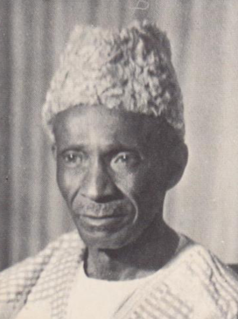
Sir Milton Augustus Strieby Margai was a Sierra Leonean doctor and politician who served as the country's head of government from 1954 until his death in 1964. He was titled Chief Minister from 1954 to 1960, and then Prime Minister from 1961 onwards. Margai studied medicine in England, and upon returning to homeland became a prominent public health campaigner. He entered politics as the founder and inaugural leader of the Sierra Leone People's Party. Margai oversaw Sierra Leone's transition to independence, which occurred in 1961. He died in office aged 68, and was succeeded as prime minister by his brother Albert. Margai enjoyed the support of Sierra Leoneans across classes, who respected his moderate style, friendly demeanor, and political savvy.
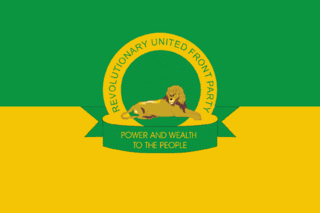
The Revolutionary United Front (RUF) was a rebel army that fought a failed eleven-year war in Sierra Leone, starting in 1991 and ending in 2002. It later developed into a political party, which still exists today. The three most senior surviving leaders, Issa Sesay, Morris Kallon and Augustine Gbao, were convicted in February 2009 of war crimes and crimes against humanity.
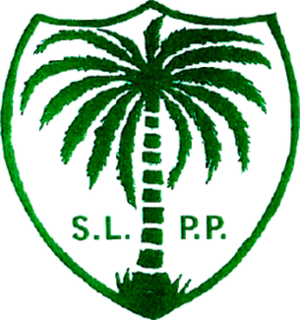
The Sierra Leone People's Party (SLPP) is one of the two major political parties in Sierra Leone, along with the All People's Congress (APC). It is the current ruling party in Sierra Leone since 4 April 2018.

The Mende people are one of the two largest ethnic groups in Sierra Leone; their neighbours, the Temne people, have roughly the same population. The Mende and Temne each account for slightly more than 30% of the total population. The Mende are predominantly found in the Southern Province and the Eastern Province, while the Temne are found primarily in the Northern Province and the Western Area, including the capital city of Freetown. Some of the major cities with significant Mende populations include Bo, Kenema, Kailahun, and Moyamba.

Siaka Probyn Stevens was the leader of Sierra Leone from 1967 to 1985, serving as Prime Minister from 1967 to 1971 and as President from 1971 to 1985. Stevens' leadership was often characterized by patrimonial rule and self-indulgence, consolidating power by means of corruption and exploitation.

Valentine Esegragbo Melvine Strasser is an ex-military leader who served as head of state of Sierra Leone from 1992 to 1996. He had been a junior military officer but in 1992, he became the world's youngest Head of State when he seized power three days after his 25th birthday. He was the leading member in a group of six young Sierra Leonean soldiers who overthrew president Joseph Saidu Momoh on 29 April 1992 military coup. They established a military junta called the National Provisional Ruling Council (NPRC).

Major General Joseph Saidu Momoh, OOR, OBE served as President of Sierra Leone from November 1985 to April 29, 1992.
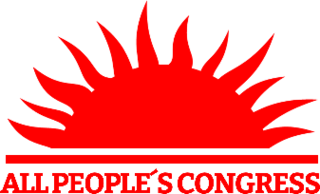
The All People's Congress (APC) is one of the two major political parties in Sierra Leone, the other being the Sierra Leone People's Party (SLPP). The APC is the main opposition party in Sierra Leone since 4 April 2018 when Julius Maada Bio of the SLPP won the 2018 presidential elections, though it maintains a majority in parliament.

Kenema is the third largest city in Sierra Leone, and the largest city in the country's Eastern Province. It is the capital of Kenema District and a major economic center of the Eastern Province. At the 2015 national census, Kenema had a population of 200,354. Kenema is located approximately 200 miles from Freetown, and 60 kilometres (40 mi) south of Bo.
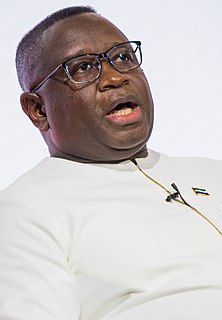
Julius Maada Bio is a Sierra Leonean politician, and the current president of Sierra Leone since April 4, 2018. He is a retired Brigadier General in the Sierra Leone Army and was the military Head of State of Sierra Leone from January 16, 1996, to March 29, 1996 in a military Junta government. As the candidate of the main opposition Sierra Leone People's Party, Bio defeated Samura Kamara of the ruling All People's Congress in the runoff vote of the 2018 Sierra Leone presidential election with 51.8% of the votes to Kamara's 48.2%. International and local observers declared the election free, fair and credible. Bio succeeded Ernest Bai Koroma as president. As the main opposition leader, Bio was a critic of his predecessor president Ernest Bai Koroma and his administration. As president, Bio has overturned most of the policies of Ernest Bai Koroma, whom he accuses of corruption.
The Ndogboyosoi War, also known as the Bush Devil War, was an episode of political violence that occurred in 1982 between supporters of the All People's Congress (APC) and the Sierra Leone People's Party (SLPP) in Sierra Leone. The violence was centered in Pujehun District, especially in the Soro-Gbema chiefdom. It was triggered by the ruling APC party's alleged electoral manipulation and the intervention of a special squad of customs police against supporters of the SLPP candidate.

Ernest Bai Koroma is a Sierra Leonean politician who served as the fourth President of Sierra Leone from 17 September 2007 to 4 April 2018.
Abass Chernor Bundu is a Sierra Leonean politician, diplomat, and the current Speaker of the House of Sierra Leone House of Parliament, in office since April 25, 2018. Bundu was elected speaker by receiving 70 votes in Parliament. The main opposition the All People's Congress, which won the most seats in Parliament, boycotted the election process in protest and did not nominate a candidate for speaker Archived 26 April 2018 at the Wayback Machine. Bundu is a veteran politician, and a very close ally and personal friend of Sierra Leone"s president Julius Maada Bio
Articles related to Sierra Leone include:

General elections were held in Sierra Leone on 11 August 2007. Seven candidates competed in the first round of the presidential election; no candidate received the necessary 55% of the vote to win in the first round, and a second round was held between the top two candidates, Ernest Bai Koroma of the All People's Congress (APC) and Solomon Berewa of the Sierra Leone People's Party (SLPP), on 8 September. According to official results, Koroma won the election with 54.6% of the vote.
The 1992 Sierra Leonean coup d'état was a coup d'état against the government of Sierra Leone by a group of young military officers led by 25-year-old Captain Valentine Strasser on 29 April 1992. Strasser took control of the government, deposing President Joseph Saidu Momoh.